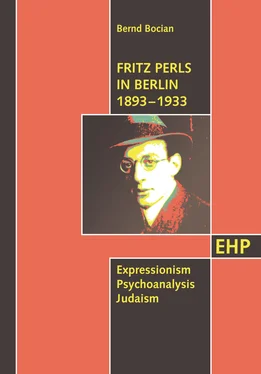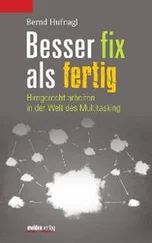Bernd Bocian - Fritz Perls in Berlin 1893 - 1933
Здесь есть возможность читать онлайн «Bernd Bocian - Fritz Perls in Berlin 1893 - 1933» — ознакомительный отрывок электронной книги совершенно бесплатно, а после прочтения отрывка купить полную версию. В некоторых случаях можно слушать аудио, скачать через торрент в формате fb2 и присутствует краткое содержание. Жанр: unrecognised, на английском языке. Описание произведения, (предисловие) а так же отзывы посетителей доступны на портале библиотеки ЛибКат.
- Название:Fritz Perls in Berlin 1893 - 1933
- Автор:
- Жанр:
- Год:неизвестен
- ISBN:нет данных
- Рейтинг книги:3 / 5. Голосов: 1
-
Избранное:Добавить в избранное
- Отзывы:
-
Ваша оценка:
- 60
- 1
- 2
- 3
- 4
- 5
Fritz Perls in Berlin 1893 - 1933: краткое содержание, описание и аннотация
Предлагаем к чтению аннотацию, описание, краткое содержание или предисловие (зависит от того, что написал сам автор книги «Fritz Perls in Berlin 1893 - 1933»). Если вы не нашли необходимую информацию о книге — напишите в комментариях, мы постараемся отыскать её.
Fritz Perls in Berlin 1893 - 1933 — читать онлайн ознакомительный отрывок
Ниже представлен текст книги, разбитый по страницам. Система сохранения места последней прочитанной страницы, позволяет с удобством читать онлайн бесплатно книгу «Fritz Perls in Berlin 1893 - 1933», без необходимости каждый раз заново искать на чём Вы остановились. Поставьте закладку, и сможете в любой момент перейти на страницу, на которой закончили чтение.
Интервал:
Закладка:
This must be borne in mind when we reflect on Perls and evaluate him. The personal weaknesses and emotional disturbances that he freely revealed, say, his fluctuation between a feeling worthlessness and a sense of grandeur, cannot be traced exclusively to early childhood experiences within the family environment. Such reactions are field phenomena and overdetermined, with cultural, social, and family conditions impinging on the individual simultaneously.
Perls’s school career was interrupted because he had to repeat a class three times, and he was taken out of the Gymnasium. Much like Victor Klemperer and Max Horkheimer, he was initially placed in a commercial apprenticeship with a cloth merchant. He behaved poorly, played jokes on his boss, and was fired (see Perls 1977, 253).
Ferdinand Knopf, likewise a »failure« at school and a friend of Perls’s whom the latter accepted as a kind of leader, found a new school for both of them. It was the Askanisches Gymnasium, where a number of teachers with a reformed pedagogical orientation apparently took an interest in the well-being of their charges (see ibid., 253 f.). His scholastic intelligence blossomed once again, and his final written exams were so good that his orals were waived (see L. Perls 1997, 46). In the 1913/14 school year, which ended at Easter in 1914, he received his »Abitur« 31at age 20 after attending the school for four years. According to that, he had entered the school in the academic year of 1910/11. 32
When Perls mentions that he liked some of his teachers, that probably also means that he felt liked by them. Here, a theme emerges which is the polar opposite to rebellion, namely, a yearning for belonging that could also lean toward subordination in his early friendships. Subordination also allows one to experience a sense of belonging and security, and it is a form of total experience to which huge numbers of individuals surrendered in Germany after 1933. For Perls as a pupil at school, this was commingled with an attempt to assure himself the affection of his »handsome« Aryan classmates as a means of counterbalancing the »ugly« Jewish part of himself. He put the gold piece he had stolen from his father’s locked room to use for this purpose. »I extricated that gold piece and with it I bought stamps for my handsome blond Christian friend, hoping to buy his friendship or as a token of my friendship« (Perls 1977, 251). In general he remarks: »The friends I had in my earlier and later youth were always boys to whom I could surrender« (ibid., 236). In terms of family history, this is a question of lacking triangulation, the complementation of the dyadic relationship with the mother through a third, male individual who supports a different orientation and thereby reduces the ambivalence of the son’s detachment from the mother. The lack of positive affirmation by a man, a father, manifested itself in Perls as a lifelong yearning for acceptance by a male father figure, from which he was never released. The curt reaction Perls experienced when he visited Freud in Vienna in 1936, made the painful experience of rejection in the past come alive again in massive terms and probably accelerated his decision to make himself independent of the psychoanalytic organization. Family therapist Virginia Satir, who worked at Esalen together with Perls in his later years, formulated a valuable impression after Perls told her of his painful experience with Freud: »I got so much the feeling that Fritz couldn’t do good fathering, because he himself didn’t have a good fathering. (…) I often thought that he was a great man who really never felt loved by another man. (…) The thing that kept coming through was an expectation that he wouldn’t be understood« (in Gaines 1979, 269).
As a man over 70 years of age, Perls wrote the following about Selig Morgenrath, who was a sculptor and the architect of the Esalen Institute:
To watch him and his involvement and understanding with humans, animals, and plants, to compare his unobtrusiveness and confidence with my excitability and primadonna-ishnes, to feel at last the presence of a man to whom I feel inferior, and finally the feeling of mutual respect and friendship that came about – all of this has helped me to overcome most of my pompousness and phoniness. (Perls 1977, 70)
3.5 Perls’s Father. An Irregular Freemason
There were clear parallels between Fritz Perls and his father. »His father was eccentric, very much like Fritz, not a family man« (L. Perls 1997, 57). A well-ordered family life posed difficulties for the father and the son. For a large part of their lives both men were wandering nomads, had numerous extramarital affairs, and possessed a talent for winning people for themselves and their ideas and for creating a certain amount of enthusiasm. Conflict with the father was, as I have already mentioned, an experience that united a generation and can be seen as well in the personal lives of Kafka, Benjamin, Hesse, and Horkheimer. In all of the individuals named, including Perls, an orientation toward the mother is also to be found with respect to their mutual negative appraisal of their fathers. Erich Fromm, for example, whose father was also a wine merchant, likewise viewed himself as the defender of his often depressive mother against his father within the web of their mutual »unconscious hatred« (Funk 1990, 21). In the Perls household the hatred was not unconscious, nor was it apparently suffered in silence. Emotions would occasionally erupt and result in outright fighting, which was physical as well. In his old age, Perls was able to adopt a critical and differentiated perspective that also allowed for the likable, Dionysian side of his father’s character. This can probably be traced to Perls’s realization that he himself had failed as a husband and family man, and that blame for the failure was being placed exclusively on him. »At the parties, for instance Christmas, however, my father became his Rabelaisian self. He loved to dance the krapolka, to drink, to kiss. (…) Basically I hated him and his pompous righteousness, but he also could be loving and warm. How much my attitude was influenced by my mother’s hatred of him, how much she poisoned us children with it, I could not say. (Perls 1977, 250-251).
Freemason Nathan Perls was at first apparently a member of a so-called Odd Fellow Lodge. This »Independent Order of Odd Fellows« was founded in England around 1780, operated on a Christian basis, and viewed itself as a kind of confraternity in which the brothers supported each other socially and also engaged in charity work. Official Freemasonry in Germany did not accept this Lodge (and many others for that matter) as a Freemason Lodge and spoke of irregular foundings and Lodge-like organizations that had no connection with official Freemasonry (see Kischke 1999, 66). Peters calls them the »non-accepted brothers« (Peters n. d., 145) and thereby addresses a commonality shared by Nathan Perls and his son. Whereas for Nathan Perls it was official Prussian Freemasonry with its legally enshrined monopoly on founding lodges, for Fritz it was orthodox psychoanalysis and its bureaucratic apparatus that refused him a secure position. Father and son alike reacted by founding things of their own.
3.5.1 »The Order of Humanists« and the Peculiarity of Life in Nathan Perls’s Lodges
In 1914, A. P. Eberhard published a book entitled Von den Winkellogen Deutschlands (Germany’s Irregular Lodges) which contains a chapter on »Gründungen des Nathan Perls in Berlin 1892–1913« (Lodges Founded by Nathan Perls in Berlin 1892–1913). Nathan Perls was not a member of the exclusively Jewish B’nai B’rith lodges that had also existed in Germany since 1882 and to which Freud had belonged. This is an indication that Perls viewed himself not primarily as a Jew but rather as a humanist in the sense of the Enlightenment. I suspect that initially Nathan Perls’s ambition was directed toward becoming a member of one of Prussia’s major legal Freemason lodges, rather than a typical bourgeois-Jewish parallel organization (B’nai B’rith, for example) that existed for all types of German clubs and associations. Historically speaking, Hermann Settegast was an important figure in this respect. He interpreted the concept of Freemasonry in a liberal-humanitarian sense and was up in arms that existing Prussian grand lodges held a monopoly on founding new ones and that »Jewish seekers« were not accepted (Peters ibid., 138). In the year 1892, he founded his own lodge without permission from the official grand lodges and brought a successful law suit for the right to do so. Nathan Perls is listed among the founders of Settegast’s lodge (see Peters ibid., 147). However, the by-laws of the new lodge required that members had previously belonged to recognized lodges. For Nathan Perls, a member of the Odd Fellows, this did not apply, and he was therefore »not allowed to participate in further deliberations« (Eberhardt 1914, 109). Since the Settegast action had opened up the possibility, Nathan thereupon founded the first of his own independent lodges of the »Unabhängiger Freimaurerorden – Orden der Humanisten« (Independent Order of Freemasons – Order of Humanists) (ibid.). Many other lodges would be founded subsequently. Eberhard reports: »Perls is a man of good extraction and has an extensive circle of acquaintances and clients. It is therefore not difficult for him to establish a number of lodges in a wide range of German cities in a matter of only a few months. After all, he travels some nine months a year« (ibid.).
Читать дальшеИнтервал:
Закладка:
Похожие книги на «Fritz Perls in Berlin 1893 - 1933»
Представляем Вашему вниманию похожие книги на «Fritz Perls in Berlin 1893 - 1933» списком для выбора. Мы отобрали схожую по названию и смыслу литературу в надежде предоставить читателям больше вариантов отыскать новые, интересные, ещё непрочитанные произведения.
Обсуждение, отзывы о книге «Fritz Perls in Berlin 1893 - 1933» и просто собственные мнения читателей. Оставьте ваши комментарии, напишите, что Вы думаете о произведении, его смысле или главных героях. Укажите что конкретно понравилось, а что нет, и почему Вы так считаете.











